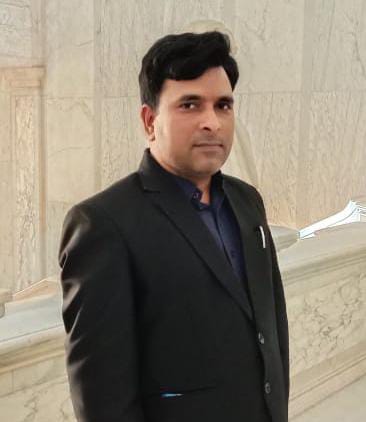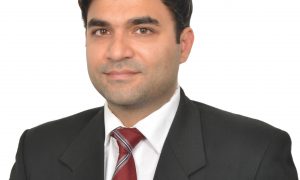This interview has been published by Namrata Singh and The SuperLawyer Team

Could you share with us a bit about yourself and your journey to becoming the Head & DGM-Legal at Bihar Industrial Area Development Authority (BIADA)? What inspired you to pursue a career in law, and what challenges did you encounter along the way?
I am a first-generation lawyer born and brought up in West Champaran district of Bihar. After my B.A. (Hons.) from Faculty of Arts, BHU, I pursued LL.B. from Law School, B.H.U. and embarked my legal journey with challenges of not having the benefit of a well-trodden path or sage advice. My parents and my younger brother gave me their unwavering support in all my decisions. Guided by serendipity, I found myself at the BHU, Varanasi. I started practicing in Patna High Court and my erstwhile practice area involved a diversified spectrum of legal jurisprudence. After practicing for over three years in Patna, I moved to Mumbai, where I worked as Law officer of Transport Corporation of India Limited, Mumbai for handling all the legal affairs within the state of Maharashtra. Onwards I worked as Examiner of TradeMarks in the Trade Mark Registry Mumbai. After which I joined Videocon d2h Limited, Mumbai, wherein I was also part of the team for the execution of the India’s largest Media Sector merger of Brand Videocon d2h into Dish TV. After merger, I migrated to Dish TV India Limited, Noida and successfully handled litigation and contract management for both brands d2h and dish TV.
After years of experience in broadcasting and distribution related to the DTH Industry, I joined Hathway Digital Limited a multisystem operator of Reliance Jio Group as a Senior Manager -Legal in Delhi. In this role I managed Pan India Litigations before TDSAT, Trial Courts, High Courts, Consumer Forums and Supreme Court. Thereafter, I joined Micromax Group as head of Legal and finally joined as DGM-Legal in BIADA, Patna. During working with different organizations from a practising advocate, corporates and government sectors in different cities, I found that we need to adopt the work culture at earliest and you have to learn something from everyone as once my mentor has said everyone is your client except yourself. You have to create your own brand and for this you need to accept all the challenges with a smile.
You’ve had a diverse career journey, from practicing law in Patna to working with major corporations in Mumbai and Delhi. What motivated you to transition from the corporate sector to a government role at BIADA, and return to your home state of Bihar and take on a role with BIADA?
The diverse career journey had its perks but at the same time there was remorse in my mind that having reached the pinnacle of my career. I was never in a position to give it back to the society from where I belonged. Everyone has his or her perspective towards the way of contribution for a better and prosperous society, but from my spectrum of things this endeavour to join this government organization was to achieve a more industrialized and prosperous Bihar by removing the hurdles faced by entrepreneurs and streamlining the legal process attached to it.
As someone deeply rooted in Bihar’s history and culture, how do you envision the role of BIADA in contributing to the state’s development and economic growth? What initiatives or projects are you most excited about?
BIADA has been envisioned to promote and augment industrialization and create awareness about the Industrial Policy of the state as well as creating an environment for consistent growth of Industries in the state. The management finds it highly important to change the way these units operate for a few reasons, such as Changing priorities of units, Enhancing the effectiveness of organizations, initiating new schemes, there is an enormous scope of things which could be improved considering the Industrial growth, Bihar is growing. The role as DGM, Legal is quite dynamic and varied as one has to juggle a lot between Courts and Policy decisions. I endeavour for transparent policy formulation whereby policies are fair, simple and comprehensive. Also, such policies are required to be formulated for instilling faith upon Corporate and at the same time better execution of such for the organization. At present, investors are coming to Bihar and a number of Industrialist and Start up have been seeded there huge investment in State with a vision for development of Bihar. Therefore, by my small contribution I am participating in the development of my state by use of my legal, strategy and advisory skills.
With the recent influx of investors and industrialists into Bihar, what are some of the legal challenges and opportunities that BIADA faces in facilitating economic development while ensuring regulatory compliance and transparency?
The fragmented land-holding and lack of large pool of land is a reality in Bihar yet by undertaking various persuasions have been in a position to make sufficient land available for the Investors and Industrialists. The biggest huddle which we constantly face is to get back the large chunk of land which was not used for industrialization and to allot the same to the prospective investors. There are innumerable stakeholders and to take everyone on board for the furtherance of development of Bihar is quite a task. At present the government is providing better policies and support for establishment and revival of industries in the state.
As someone who has worked across different states and industries, what do you find most rewarding about working in the public sector, particularly in Bihar? How does it differ from your experiences in the private sector?
To be honest, in the last years or so with BIADA, I have evolved as a person who has made several required changes in the existing system based on prior experiences and current needs of the state. It was an enlightening experience to work within the multi-layered and complex structures learning nuances of executing and facilitating Industrialization in state. The perspective of being an outsider was a blessing in disguise as people believed that I had joined this organisation for a purpose and that it provided me with cooperation from everybody in the organization.
In your role as Head & DGM-Legal, what strategies do you employ to foster collaboration and synergy within your team of in-house legal professionals and panel advocates? How do you ensure effective communication and coordination?
Coordination between youth professionals and experienced minds to achieve better results is one of the mantras I work with. I am very privileged to have an in-house team consisting of law graduates from National law Universities and other reputed law colleges and as an icing on the cake there are experienced Advocates on our Panel and together we bring a diversified approach to the table for better and fast results. With such a big team, it becomes very important to have open and transparent communication. It is very important to promote team members irrespective of their position in the hierarchy of the organisation to brainstorm ideas and communicate their opinions in regard to every case. Fortunately, I am blessed with a dedicated team and together we discuss and prepare notes of argument and strategy in each case. I cherished the participative work culture of the organisation wherein everybody gets to contribute something.
Being from a corporate background, I tend to promote the modern work approach and use of technologies for better collaborations with cluster offices and our Panel Advocates in the High Court as well as in the Supreme Court.
With your experience in handling a wide range of legal matters, what are some common misconceptions about the legal profession that you would like to debunk for aspiring lawyers?
One of the common misconceptions about the legal profession is that there are limited prospects in the legal sectors. However, in this modern world, everyone needs the application of legal minds which opens a plethora of opportunities before the law students. In the era of globalization, even cross-border opportunities open up for the youths. Another misconception lies that law is not for women but here I would like to take this opportunity and say the legal field is gender neutral and 50% of my team members are female and they demonstrate relicense, time management and good analytical skills.
Apart from your professional endeavors, what are some of your personal interests or hobbies that you enjoy outside of work? How do you balance your personal life with the demands of your role at BAIADA?
For work life balance, I would like to thank my soul mate Sarika who wholeheartedly takes care of my two lovely daughters and family. The preoccupation in my current role doesn’t allow me to spare much time for personal interests or hobbies limited to watching news and outings beyond my work but quality time with my family instills me with strength, love, affection and peace.
Given your experience in both the corporate and government sectors, what advice would you offer to young professionals aspiring to build a successful career in law, especially in the context of navigating different work environments?
I firmly believe in the famous quote that “there is no substitute for hard work”. Both corporate and public sectors have their own pros and cons, however it is important to set one’s priority straight why making a pick and one should not shy away from giving their best in whichever sector they choose. This brings out best performance helping the individual to excel in his/her career
Get in touch with Ritesh Ranjan-

























